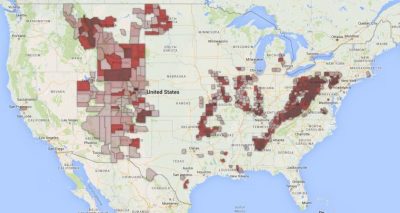On June 27, the House Natural Resources Committee passed the RECLAIM Act, a bipartisan bill introduced by Rep. Hal Rogers (R-Ky.) aimed at revitalizing coal mining communities. The legislation would direct $1 billion over five years to restoring abandoned mine lands.
Committee members also approved an amendment put forward by Rep. Don Beyer (D-Va.) to require projects that receive funding under the bill to spur local economic development — an improvement to an earlier version that concerned Appalachian Voices and our allies.

The darker the red, the greater the extend of remaining abandoned mines. Image by The Daily Yonder
While the earlier version still provided money to states to clean up abandoned mines, it would have failed to make the most of every dollar because it did not require projects to include economic development. With the Beyer amendment, the RECLAIM Act is whole again. It will provide money to states and encourage economic projects and community outreach.
The RECLAIM Act passed on a voice vote against the objections of the National Mining Association, which decided to oppose the bill at the last minute. It now goes to the full House for a vote, though we don’t yet have a date for that vote.
A couple points of clarification are needed to help understand the bill:
- The bill is not bailing out coal companies. The abandoned mine lands that will be restored under RECLAIM are exclusively from before 1977 and have no existing owner or operator attached to them. Companies with outstanding reclamation obligations still have to clean up their mess.
- The bill is not funded by taxpayers. The money comes from the Abandoned Mine Land fund, which has collected money over the past 40 years from coal mining companies by placing a fee on each ton of coal produced.
- The bill will not misuse AML funds. The money from the AML fund must be spent on reclamation, and it still will be under RECLAIM. But by combining it with economic development projects with local buy-in, communities can create new economic opportunities on abandoned mine lands. Here’s a list of a handful of possibilities we’ve come up with in Virginia.
We’re extremely excited to get as far as we have. Passing a bipartisan bill through the committee is a huge step forward, but there’s still much to be done. Appalachian senators Mitch McConnell (R-Ky.) and Joe Manchin (D-W.Va.) have each introduced versions of the RECLAIM Act in the Senate. We need to get the bill passed on the floor of the House of Representatives and get the Senate to take action. The good news is that, with this week’s victory, we can get all of that done!
Fight on.



We have folks suffering the aftermath of mining abuses and it was very encouraging to read this article, esp. regarding the coordination of reclamation with economic development to achieve maximum benefit to affected communities. It sounds like the value of their homes and land might have a chance to recover.
May I ask: does the AML policy extend to all extractive industry -and is there hope for grievously affected U.S. communities in other areas?
Very helpful, lot of good information. Thank you!
One thing about companies that have avoided reclamation, we need to be able to take back the land for public use. I am in the DC area too. I do a lot of work on urban wildlife habitat although I grew up in the coalfields roaming the woods. So much of what I loved has been destroyed. So we need to find a way to restore wildlife on surface mined land too, by restoring the native plants, trees and stream beds. It would be good to do an ecological survey of the surface mined lands. Further, since the land has been permanently modified from a slope to bench lands, it would be okay to turn some of this into wetlands since wetlands have been destroyed in other places. It would be great to install solar panels too. I am writing a history of my hometown, Pilgrim Knob, VA.